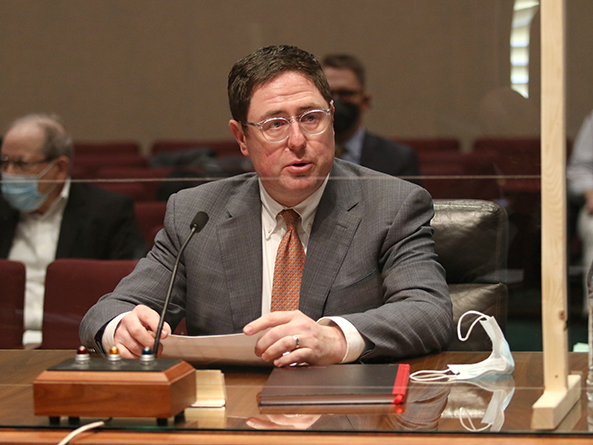Bill would expand use of virtual meetings
City councils, county boards and other political subdivisions would have greater authority to meet virtually under a bill considered Jan. 27 by the Government, Military and Veterans Affairs Committee.

Gov. Pete Ricketts issued an executive order in March of 2020 that waived aspects of the Open Meetings Act and allowed some government entities to meet virtually during the coronavirus pandemic. That order was lifted last summer.
LB83, introduced by Norfolk Sen. Mike Flood, would allow mayors, county board chairpersons and village board chairpersons to declare an emergency and hold meetings virtually. The bill defines virtual conferencing as a meeting conducted electronically or by phone.
Political subdivisions currently subject to the state’s Open Meetings Act and allowed to conduct meetings by video conferencing and teleconferencing would be allowed to hold virtual meetings. The bill would expand the list of political subdivisions allowed to meet virtually to include natural resources districts and local public health districts.
Advanced public notice would be required for virtual meetings, with at least one physical site available for public participation. All documents related to a virtual meeting would need to be available online.
LB83 also would restrict the virtual meeting option to no more than half of an entity’s meetings during a calendar year.
“This is a way to modernize the way virtual meetings are dealt with by public bodies,” Flood said. “[In an emergency] the people closest to the problem have the best answers.”
Larry Ruth, testifying on behalf of the Nebraska Association of Resources Districts and the Lower Platte South Resources District, spoke in support of the bill. Ruth said the ongoing coronavirus pandemic has made in-person meetings more difficult. Many political subdivisions do not have a facility that would allow for public participation and social distancing, he said, forcing some individuals to choose between doing their job or staying safe.
“Being a member of a public body does not mean signing a suicide pact,” Ruth said.
Shelley Sahling-Zart, testifying on behalf of the Nebraska Power Association, also supported LB83. She said the bill would serve as a contingency plan that would enable political subdivisions to continue their work during a prolonged emergency.
“This is about being able to continue doing the public’s business in moments of extraordinary disruption,” Sahling-Zart said.
Also testifying in support was Kathy Hoell of Papillion. In written testimony, she said the expanded use of virtual meetings during the pandemic has enabled more people to participate in public meetings, particularly individuals with disabilities and those living in rural areas.
Matt Miltenberger, chief of staff for the governor, opposed LB83. Miltenberger said that while Ricketts believes the state’s open meetings laws can be modernized, he opposes extending power to waive public meeting requirements to local officials who declare emergencies.
In written testimony, he said the purpose of the Open Meetings Act is to ensure that citizens can, “exercise their democratic privilege of attending and speaking at a public meeting. A declared public emergency does not intrinsically mean it is unsafe for a public body to meet in person.”
Lance Molina of Gretna also testified against LB83. He said the bill would enable organizations to ignore citizens with whom they disagree.
“Electronic conferencing allows a body of government to mute any member of the public,” Molina said.
The committee took no immediate action on LB83.


